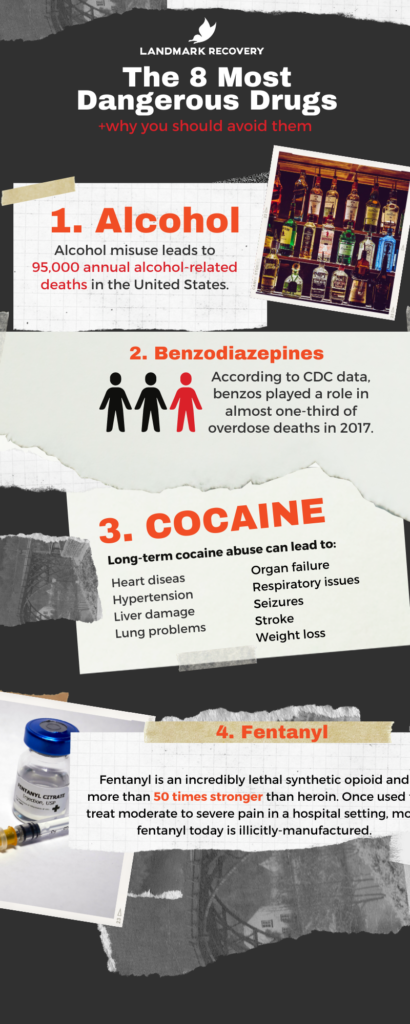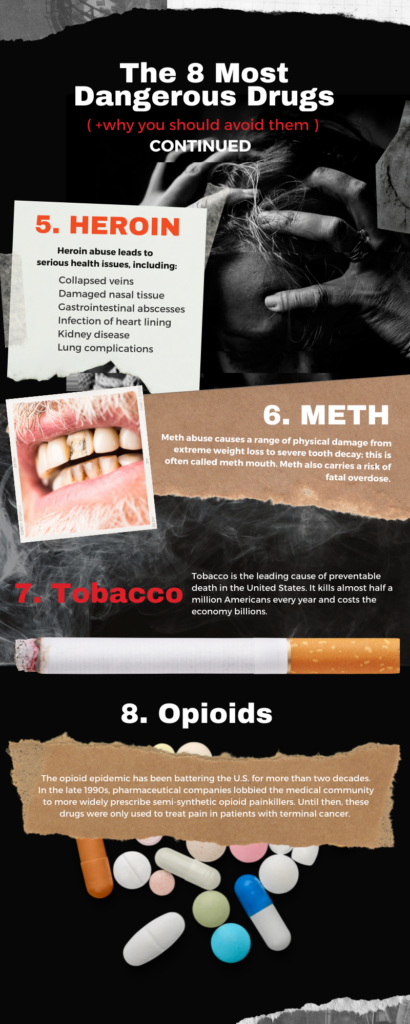Believe it or not: It is not just illegal drugs that are dangerous. A few of the “Most Dangerous Drugs” we have on our list might even surprise you. Our recommendation is to steer clear of the substances on our shortlist, and we even offer a few reasons you should consider before consuming.
8 Most Dangerous Drugs
- Alcohol
- Fentanyl
- Opioids
- Benzodiazepines
- Cocaine/Crack
- Heroin
- Methamphetamine
- Tobacco
1) Alcohol
Alcohol is the third-leading cause of preventable death; tobacco is the #1 killer, followed by poor diet and inactivity. Alcohol misuse leads to 95,000 annual alcohol-related deaths in the United States.
The way alcohol is celebrated and socially accepted means it is also one of the most difficult substances to quit if you develop alcohol use disorder. According to the 2019 NSDUH (National Survey on Drug Use and Health), 25% of over-18-year-olds reported binge drinking, while 14.5 million satisfied the criteria for alcohol use disorder.
Alcohol abuse triggers a battery of negative health outcomes, both short-term and long-term. With the right combination of medication-assisted treatment and psychotherapy, though, you can recover from even severe AUD.
2) Fentanyl
Fentanyl is an incredibly lethal synthetic opioid and more than 50 times stronger than heroin. Once used to treat moderate to severe pain in a hospital setting, most fentanyl today is illicitly-manufactured.
Many suppliers cut or lace heroin with fentanyl. It is cheap to produce and increases the potency of the heroin dramatically. Increasingly, black-market prescription opioids like Oxycodone and Vicodin are illegally pressed pills containing fentanyl. Unfortunately, and especially for unsuspecting end users, this can lead to injecting the usual amount of heroin only to fatally overdose due to the extra potency.
If you are addicted to fentanyl, you should seek professional treatment rather than attempting to quit cold turkey.
3) Opioids
The opioid epidemic has been battering the U.S. for more than two decades. In the late 1990s, pharmaceutical companies lobbied the medical community to prescribe semi-synthetic opioid painkillers more widely. Until then, these drugs were only used to treat pain in patients with terminal cancer.
Companies like Purdue Pharma downplayed the addictive potential of these medications, claiming they were safe to use. As millions of Americans discovered, opioids are strongly addictive as tolerance builds quickly. The high potential for misuse, and especially high overdose rates, makes this category of drugs especially deadly.
4) Benzodiazepines
Benzodiazepines, commonly abbreviated to benzos, are prescription medications typically used to treat anxiety disorders and panic disorders. According to CDC data, benzos played a role in almost one-third of overdose deaths in 2017.
Used short-term, benzos are remarkably efficient, alleviating the symptoms of these disorders and providing quick relief. Unfortunately, tolerance rapidly builds and you can soon find yourself dependent on this drug. When used in combination with other drugs like alcohol or opioids, the risk of experiencing negative side effects is increased.
Trying to discontinue use is challenging and results in uncomfortable withdrawal symptoms. Often, you will experience rebound symptoms, where the symptoms you were using benzodiazepines to treat return sometimes even more intensely.

5) Cocaine/Crack
Even if the first two entries on our list of the most dangerous drugs surprised you, you are likely less surprised about the dangers of cocaine and crack cocaine. A powerful stimulant derived from the leaves of the South American coca plant, cocaine is devilishly addictive, even more so when smoked in the form of crack rocks.
Long-term cocaine abuse can lead to:
- Heart disease
- Hypertension
- Liver damage
- Lung problems
- Organ failure
- Respiratory issues
- Seizures
- Stroke
- Weight loss
With cocaine-related overdose deaths increasing in recent years and fentanyl starting to show up in cocaine as well as heroin, the hype of the crack epidemic may have died down, but cocaine remains a clear and present danger.
6) Heroin
Heroin also is a highly addictive (and illegal) drug. A semi-synthetic opioid, heroin is made using morphine, a substance found in the seed pods of opium poppy plants. With the number of heroin users continuing to climb, a large chunk of new heroin users arrive at the drug via prescription opioids.
Heroin abuse leads to addiction and triggers a host of serious health issues, including:
- Collapsed veins
- Damaged nasal tissue
- Gastrointestinal abscesses
- Infection of heart lining
- Kidney disease
- Lung complications
Avoid using heroin at all costs. If you are already using this powerful narcotic, you should consider engaging with a residential treatment program. A medical detox treatment center can administer FDA-approved medications that minimize the intensity of your withdrawal symptoms and your cravings.
7) Meth
Meth has ravaged communities, families, and individuals across the United States. Immortalized in the AMC classic tv show Breaking Bad, crystal meth is a psychostimulant that is both cheap and highly addictive. When smoked through a glass pipe, meth floods your system with a feeling of extreme euphoria, but the effects are fleeting, causing users to use more of the drug.
Meth abuse causes a range of physical damage from extreme weight loss to severe tooth decay; this is often called meth mouth. Meth also carries a risk of fatal overdose.
8) Tobacco
As mentioned above, tobacco is the leading cause of preventable death in the United States. It kills almost half a million Americans every year and costs the economy billions. Despite the threat of lung cancer and an increased risk of COPD, stroke, and heart disease, millions still cannot put down their cigarettes. This is largely due to the addictive nicotine content accompanied by the toxic chemicals in cigarettes.

What Comes Next
If you are struggling with the use of any of the substances we highlight today, we can help you at Landmark Recovery. Using a combination of medication-assisted treatment and psychotherapy, you can address your substance use disorder (SUD) or alcohol use disorder (AUD) along with any co-occurring mental health conditions. We have a variety of inpatient and outpatient treatment programs to suit the scope and severity of your addiction.
To explore your options, speak with one of our recovery specialists 24/7 today at 888-448-0302.

Choose Recovery Over Addiction
We're here 24/7 to help you get the care you need to live life on your terms, without drugs or alcohol. Talk to our recovery specialists today and learn about our integrated treatment programs.




